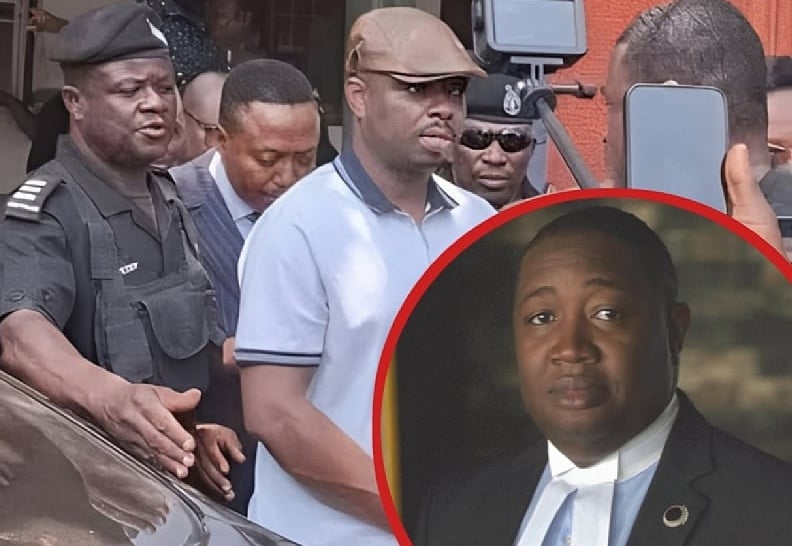The denial of bail to Kwame Baffoe, also known as Abronye DC, the Bono Regional Chairman of the opposition New Patriotic Party (NPP), by the Accra Circuit Court has ignited debate regarding the often subtle yet influential factors at play in judicial proceedings. While legal arguments and evidence form the foundation of any case, the defendant’s demeanor and conduct before the court can significantly impact the outcome, particularly when considering bail applications. This less tangible aspect of legal proceedings, brought to the fore by Lawyer Elikplim Agbemava Lorlormava’s social media commentary, suggests that even the perception of a defendant’s disposition can sway judicial decisions.
Agbemava’s argument centers on the idea that a display of “bravado” or any indication that the defendant might continue the behavior that led to the charges can jeopardize their chances of securing bail. This perspective emphasizes the pragmatic aspect of navigating the legal system, suggesting that demonstrating humility and respect for the court, even if it appears to temporarily compromise one’s assertion of innocence, can be more advantageous than a protracted legal battle. He posits that securing immediate freedom, even through a strategic presentation of oneself before the court, should be prioritized over the pursuit of vindication that might take years to achieve. This approach, while potentially controversial, underscores the practical reality that prolonged detention, regardless of eventual acquittal, can carry severe personal and professional consequences.
Abronye DC’s case serves as a focal point for this discussion. Arrested on charges of offensive conduct conducive to the breach of peace, his alleged attempts to seek political asylum in eight countries, citing political persecution and threats to his life under the ruling National Democratic Congress (NDC) government, have added a layer of political complexity to the situation. The Minority Caucus in Parliament, echoing Abronye DC’s claims of persecution, has criticized his arrest and detention, characterizing it as a politically motivated maneuver to silence dissent and suppress the opposition. They view the involvement of the National Intelligence Bureau (NIB) in Abronye DC’s detention as particularly concerning, questioning the rationale behind holding him in NIB custody while the Ghana Police Service is purportedly leading the investigation.
This intertwining of legal proceedings and political accusations raises questions about the impartiality of the judicial process and the potential influence of political pressure. The Minority Caucus’s concerns highlight the delicate balance between upholding the rule of law and safeguarding against the misuse of state institutions for political gain. The arrest and continued detention of a prominent opposition figure, particularly under circumstances perceived as politically charged, can erode public trust in the justice system and create an environment of fear and intimidation for political opponents. The judiciary’s handling of Abronye DC’s case will be closely scrutinized, as it has implications not only for his individual fate but also for the broader political landscape of Ghana.
The core of Agbemava’s argument revolves around the practicalities of securing bail. He suggests that appearing contrite and respectful in court, even if it might seem to contradict a claim of innocence, can significantly improve the chances of being granted bail. This pragmatic approach recognizes the potential hardship of prolonged detention and emphasizes the importance of securing immediate freedom. While the principle of “innocent until proven guilty” remains a cornerstone of the justice system, Agbemava’s perspective acknowledges that the perception of guilt or innocence, as formed by the court, can heavily influence bail decisions. This highlights the importance of strategic legal counsel and the need for defendants to understand the subtle dynamics at play in the courtroom.
The legal proceedings against Abronye DC bring into sharp focus the complex intersection of law, politics, and public perception. While the court’s decision on bail will be based on legal arguments and evidence, the surrounding political context and the defendant’s demeanor will undoubtedly contribute to the overall perception and outcome of the case. The continued detention of a prominent political figure, particularly amidst allegations of political persecution, raises concerns about the impartiality of the justice system and the potential for its manipulation for political purposes. This case underscores the crucial role of a transparent and independent judiciary in upholding democratic principles and safeguarding the rights of all citizens, regardless of political affiliation. As Abronye DC awaits his next court appearance, the legal and political implications of his case will continue to be a subject of intense scrutiny and debate.














